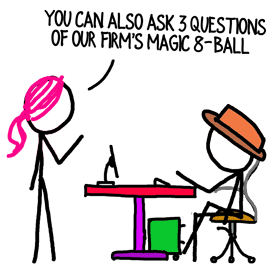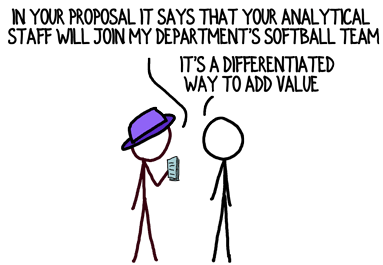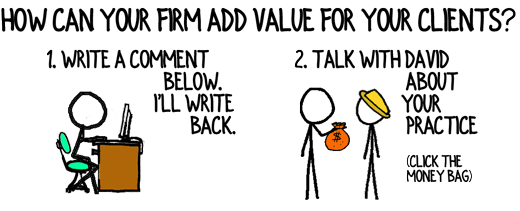Half the spinning cycle of consulting is creating value for your clients. (The other half is winning engagements.) If your consulting firm can add more value, you can win more projects from more clients at higher fees. So, let’s cover the ten best ways to add value to a consulting project.
In consulting, as in desserts, layering on the sweet stuff ensures your product will be snarfed up and produce satisfied smiles. Sure, a brownie is good, but my grandmother’s seven-layer dream bars were divine.
Similarly, a consulting project that delivers one type of value is good, but seven layers of value are going to make your clients swoon. (And sending dream bars to your clients could make you consulting firm of the year.)

The intrinsic value of a consulting project depends on the problem you’re solving for your client. Problems that are bigger, juicier and more urgent intrinsically are more valuable and will allow you to command higher fees.
The extrinsic value of your consulting project reflects the benefits you add on top of the client’s initial request. These benefits also affect the size, scope and margin of your consulting project. Generally, it’s obvious how to offer one or two classes of benefits in your consulting projects, because your client asked for them.
The question, though, is whether you can layer more extrinsic value on top of what your client asked for.
If you had a checklist of the best ways your consulting firm could add value to a consulting project, then you could quickly scan down the list and craft additional tiers of gooey, sweet, benefits.
Fortunately, we have that list!
The 10 Best Ways for Your Consulting Firm to Add Value
Solve
One classic use of consultants is identifying solutions to problems. Typically, this is top-of-mind when clients hire your consulting firm.
On the other hand, even if a client didn’t ask you to solve anything, is there a problem you could eliminate?
Represent
Clients also hire consultants to access a voice of experience in a certain industry or function. In this case, you are lending perspective as a representative of a certain class that the client is interested in—oncology physicians, or lean operators, or brownie bakers.
Highlight your expertise as a source of value in your proposal.
Advise
Enhance your value to your clients by stepping into the role of advisor and suggesting a specific course of action.
Offer go/no-go recommendations, counsel on improving leadership, strategic direction, or any of a thousand other ways you can point your clients to a better future.

Clarify
Frequently, your clients are so tangled up in the minutiae of their problems, that they’ve lost focus and direction.
Consider simplifying and prioritizing your consulting client’s efforts. That’s often perceived as enormously valuable.
Implement
Implementation on its own is staff augmentation, not consulting. However, many clients view a consulting proposal as weak or hollow if it only offers advice or a solution without any hands-on implementation.
Even though you should generally avoid “end-to-end” consulting, you can probably add value to your proposals by including some level of implementation.
Customize
IT consultants, in particular, are familiar with projects focused on customizing a particular application or software platform to meet a specific client’s needs.
If you’re not in IT consulting, take this source of value to heart. Is there a way you could boost the value of your consulting project by customizing a standardized approach or idea for your client?
Train
You can easily raise the worth of your consulting project by offering to transfer skills and knowledge. Generally this takes the form of instructing, coaching, and mentoring in a plethora of formats.
Whether it’s in-person classes, online materials, facilitated peer-groups, or some other modality, try layering some training into your projects.

Advance
Are you on the vanguard of thinking in your field? Have you developed a breakthrough approach?
You can promise to step up your client’s approaches and operations, setting them ahead of their competition and positioning them to be at the forefront of important trends.
Insulate
Sometimes, clients need an impartial voice to explain a strategy or choice to their troops.
Your consulting firm can fill that role, creating separation in an emotional situation, reducing the perception of bias, or diffusing an apparent conflict of interest. While this may not seem like consulting, it’s definitely a layer of value you should consider.
Other?
I have four other layers of value on my checklist, but I bet you can come up with even more. I’m leaving this space open for you.
What other ways can your consulting firm add value for your clients?
Text and images are © 2024 David A. Fields, all rights reserved.

 David A. Fields Consulting Group
David A. Fields Consulting Group 

One aspect I found clients to appreciate is to help them build internal consensus on a decision. Somewhat implicit in your list above, worth calling out though.
Being objective, fact driven, and helping facilitate a dialogue that is not influenced by personal biases can help build consensus.
Outstanding addition, Christian. Align is definitely another way your consulting firm can add value to a client.
All of us should ask ourselves: during the discovery process, did we notice conflict, disagreement or confusion at the client? If so, we can create value by creating alignment.
Thanks for making the list better, Christian.
I am cognizant of my Client’s Mission, Vision & Strategic Goals & Objectives when delivering my services to ensure mutual alignment.
That’s very good practice, Felix. Our consulting engagements don’t exist in a vacuum, and we have to remember that the project isn’t about us. Whatever we do and deliver for our clients has to fit within the context of their world.
Thanks for highlighting that point, Felix.
Be in tandem with modern trends in the Industry or Sector in which they operate.
Staying up to date with your clients’ business certainly puts in you in position to add value. That’s a good point!
INSULATE….not only can a consultant add value by bringing an impartial voice to the “troops” but also by advising for or against a strategy to the Board of Directors. I have found that advising against a bad strategy that has some but not all Board member support helps avoid bad outcomes and helps insulate management from having to deliver unwanted answers to selected Board members. Of course, you may or may not get repeat business, but you have added value for the company.
You’re right. There are quite a few ways that Insulating your client creates value–whether it’s insulating from the board or management or the troops. Advising against a bad course of action is one of the greatest gifts you can give your clients. That might cost you an immediate, follow-on project, but it invariably leads to a raft of referrals and later projects.
I’m glad you expanded on the Insulate theme, Ed.
New page design, David? For a moment I wasn’t sure I had landed on the right page, but when scrolling unveiled the familiar stick figures and chocolate puns, I was reassured :-). Top background, new font, no left bar, and blue-gray color scheme now look (even) more professional, albeit a tad more generic. Same great content though, thanks!
Yes, we have a new website design. Still working out the kinks. As you say, though, the content hasn’t changed–just the presentation.
BENCHMARK
I have experienced that clients often appreciate if a consultant could tell them where they stand on a particular aspect with respect to compete. This helps them get an independent view on areas they could work upon.
Good one, Lav! As you said, everyone likes to compare themselves to others (for better or worse), and we consultants can help them gather the benchmarks and also make sense of them.
Outstanding addition, Lav.
BOLSTER. Often the consultants I work with lag in confidence. When they lose prospective engagements to other consultants, it can sometimes negatively impact their confidence and attitude toward growing their consultancy. It’s important to help them believe in themselves more because they often get better results with their marketing and sales efforts.
On a side note, I’m very much enjoying your “Irresistible” book as well as your generous resources and articles. Your material is really helping me tighten things up (and verifying what I’ve been doing right) which is a big benefit to me and my clients. Thank you so much for all of it and I’m spreading the good word about you and your work—hope that’s okay. 😉
Confidence is definitely important–for consultants and for clients. Giving your clients confidence in their decisions is a key value that you can add as a consultant. (And, as you note, a side benefit is that it may help you gain confidence in your own consulting firm.)
Thanks for joining the discussion, Terry!
Oh, and thank you for the kind words about the book and resources, of course. I’m glad you’re finding them useful.